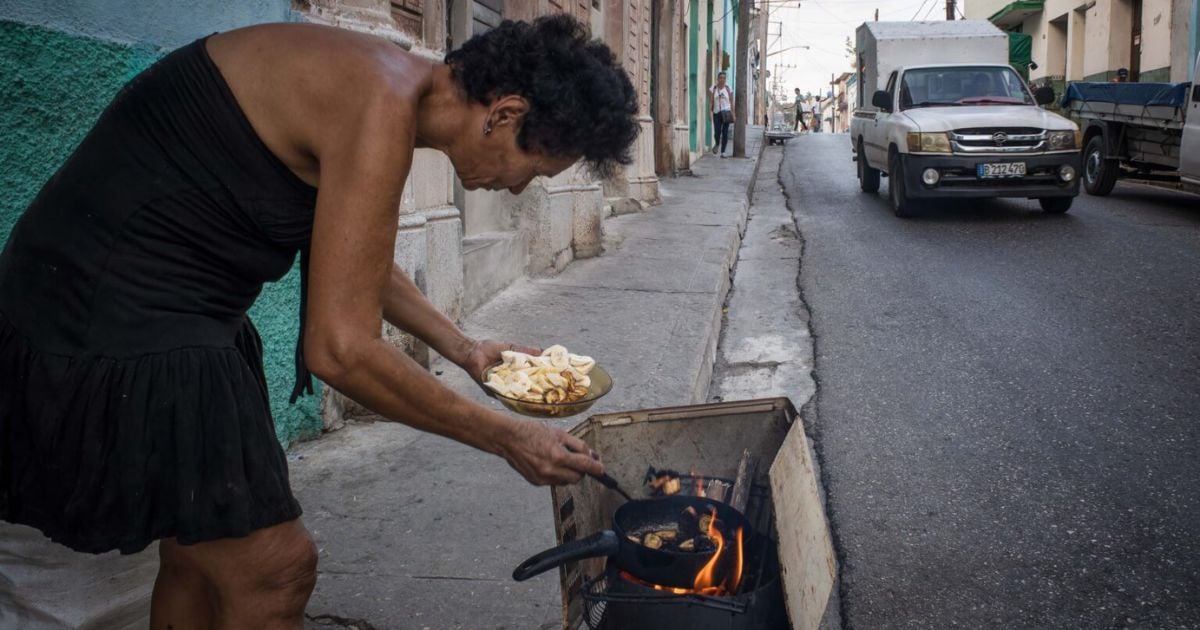In the midst of one of Cuba's most severe energy crises, over 9 million people are forced to cook under precarious, unhealthy, and hazardous conditions. This alarming situation was highlighted by the Food Monitor Program (FMP), an independent organization that has been tracking access to essential services in Cuba for the past three years.
The numbers are derived from a combination of the most recent Cuban Population and Housing Census and FMP's own studies. These sources estimate that approximately 1.7 million households rely on liquefied petroleum gas (LPG), about 2 million depend solely on electricity, and around 220,000 use manufactured gas. The remaining population is left vulnerable to power outages, gas supply disruptions, or rudimentary cooking methods.
Cooking Amidst Power Outages
With an average of 3 to 4 people per household, more than 9 million Cubans face significant challenges or a complete inability to cook meals at home, emphasized the organization. The report indicates that due to power cuts lasting up to 20 hours a day, families must cook whenever electricity is available, regardless of the time. Many prepare food during the night, consume it cold or immediately, and have reduced their daily meals.
Even before the latest collapse, 33% of households had already started skipping meals as a survival strategy, while 25% reported going to bed hungry. The direst scenario involves a rise in cooking using firewood and charcoal. Unable to use electricity or gas, thousands of families are crafting makeshift stoves from recycled materials. These practices have led to household fires and emit highly toxic gases, which the World Health Organization (WHO) associates with chronic respiratory diseases, lung cancer, and cardiovascular issues.
Impact on Women and Public Health
The burden falls predominantly on women, who are primarily responsible for cooking in Cuba, thus increasing their physical and emotional vulnerability. This energy predicament stems from an aging system reliant on imported fossil fuels. Since 2017, as acknowledged by the director of the National Electricity Union, insufficient maintenance has been provided to the nation's power plants, many of which have been operational for over 40 years. Temporary fixes, such as generator groups and Turkish floating power plants, have failed to prevent extended outages, including four complete system collapses since October 2024.
Water Crisis Compounds the Problem
The water supply is also in crisis, with over 50% of households receiving water in cycles of two to fifteen days, necessitating improper storage, reliance on electric pumps (useless during blackouts), or dependence on leaks and carrying water. According to the FMP, 54% of respondents stated they must purify water before consumption, increasing the risk of digestive diseases as summer approaches. This directly impacts food safety, hygiene, and meal preparation.
The report criticizes the government's approach, which involves imposing domestic energy consumption restrictions, suggesting lighter meals, and perpetuating a narrative centered on "resilience," while normalizing scarcity as part of the management model. For citizens, however, resilience is not a slogan; it's a daily imposition without alternatives.
Conclusion: A Widening Crisis
FMP concludes that the energy crisis is part of a broader polycrisis encompassing the deterioration of public services, mass emigration, an aging population, and the collapse of productive sectors. In this context, millions of Cubans are trapped in a reality that not only prevents them from properly feeding themselves but also denies them a minimal sense of stability in their lives. "With every blackout, with every waterless dawn, a part of the right to live with dignity is extinguished," warns the report, urging a focus on the human plight behind each unlit stove and each meal that goes unserved.
Understanding Cuba's Energy Crisis and Its Impact
Why are so many Cubans struggling to cook at home?
Due to a severe energy crisis, many Cubans face power outages and fuel shortages, leaving them without reliable means to cook, forcing them to resort to unsafe and rudimentary methods.
What are the health risks associated with the current cooking conditions in Cuba?
The use of firewood and charcoal for cooking releases toxic gases that can cause chronic respiratory diseases, lung cancer, and cardiovascular problems, posing significant health risks, especially to women.
How has the energy crisis affected water supply in Cuba?
The water crisis in Cuba is exacerbated by energy shortages, leading to irregular water supply cycles. This forces families to store water improperly and increases the risk of waterborne diseases.
